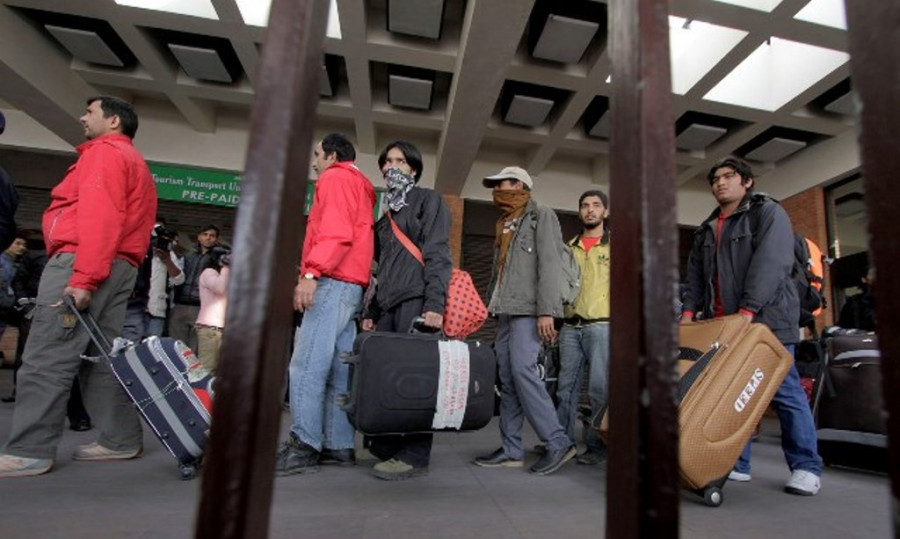National
Oman amnesty offers undocumented Nepalis chance to return home
The amnesty programme, which was introduced in October last year, has been extended till June 30.
Chandan Kumar Mandal
Omani government’s general amnesty for undocumented foreigners has once again come as a boon for many Nepalis who have been living and working in the country illegally.
Under the amnesty scheme, undocumented Nepali migrant workers can return home without facing any legal consequences, including fine payment and ban from entering the Gulf country for jobs in the future.
According to Sharmila Parajuli Dhakal, Nepali ambassador to Oman, the embassy has been actively sharing information and encouraging Nepalis living in the country without visas and other documents to take advantage of the amnesty scheme.
“The ongoing amnesty is a good chance for undocumented Nepali workers,” Dhakal told the Post over the phone from Muscat on Sunday. “We have been reaching out to potential workers so that they can go home without facing any legal consequences.”
Earlier, the Omani government had announced its general amnesty scheme for undocumented migrants in October last year. The reprieve programme, whose deadline was to expire in December of that year, was extended till March 31 of this year.
Now, the Omani authorities have once again extended the deadline till June 30, considering the Covid-19 pandemic.
“The general amnesty and its deadline extension can be a big relief for Nepali workers who still have undocumented status,” said DB Chhetri, a spokesperson for the Non-Resident Nepali Association. “Normally, those undocumented or absconding people, if found by the local authorities, are arrested and kept at deportation centres and they have to pay hefty fines. If they chose to voluntarily go back to their respective countries under the amnesty scheme, they can skip such legal issues.”
According to Chhetri, who is based in Muscat, what makes the ongoing scheme attractive is that it also provides undocumented foreigners to legalise their status and stay in Oman and they will not be prohibited from future entry.
By mid-December last year, nearly 41,000 foreigners had applied to avail of the general amnesty.
According to Oman News Agency (ONA), the Ministry of Labour announced 65,173 foreign workers had applied to leave the country under the scheme and 46,355 of them actually left before the last deadline of March 31.
The Nepal Embassy data shows that 57 Nepali migrant workers benefited under the general amnesty scheme.
According to Dhakal and Chhetri, the number may look small because Nepali workers turning undocumented in Oman is not a bigger issue than it is in other labour destination countries.
“Other countries have a larger number of undocumented workers. Our number is also small because the embassy keeps repatriating stranded and undocumented Nepali workers regularly,” said Dhakal. “The embassy keeps rescuing and repatriating especially women migrant workers, who come to work as domestic help in the country through third countries. This time, we are not receiving applications in bulk, but workers are still approaching and the embassy is helping them through the process.”
The reason behind fewer number of undocumented Nepalis in Oman is also because the Sultanate hosts a relatively smaller number of Nepali migrants than other countries in the Persian Gulf region.
According to the Labour Migration Report, 2020, Oman hosts nearly 20,000 Nepali migrants.
“By 2012-13, undocumented status used to be a major concern. The problem doesn’t look big now because we kept rescuing the workers and sending them home,” said Chhetri. “People also returned during the pandemic. However, it doesn’t mean there are no undocumented Nepalis at all. There must be some people who willingly stayed back with the hope of earning money.”
Local media has said that the amnesty scheme was launched by the Omani government in a bid to minimise the negative repercussions of the Covid-19 pandemic on various sectors.
Nepal government data has shown that more than 3,253 Nepalis have returned home since the repatriation and the resumption of regular flights in the aftermath of Covid-19 pandemic.
Meanwhile, Nepal and Oman governments are expected to sign a labour agreement soon, giving hope to the rising demands of Nepali workers in the country.
However, the migration of Nepalis to Oman, which had resumed after a long Covid-19 hiatus, has been affected due to a surge in infections in the country.
“Nepali workers’ entry to Oman has gone back to normal days of the pre-pandemic phase. Now, the feared second wave of Covid-19 and the ongoing curfew has affected their arrival,” said Chhetri. “With the signing of understanding between both countries, more job opportunities will emerge for Nepali workers.”




 16.12°C Kathmandu
16.12°C Kathmandu















